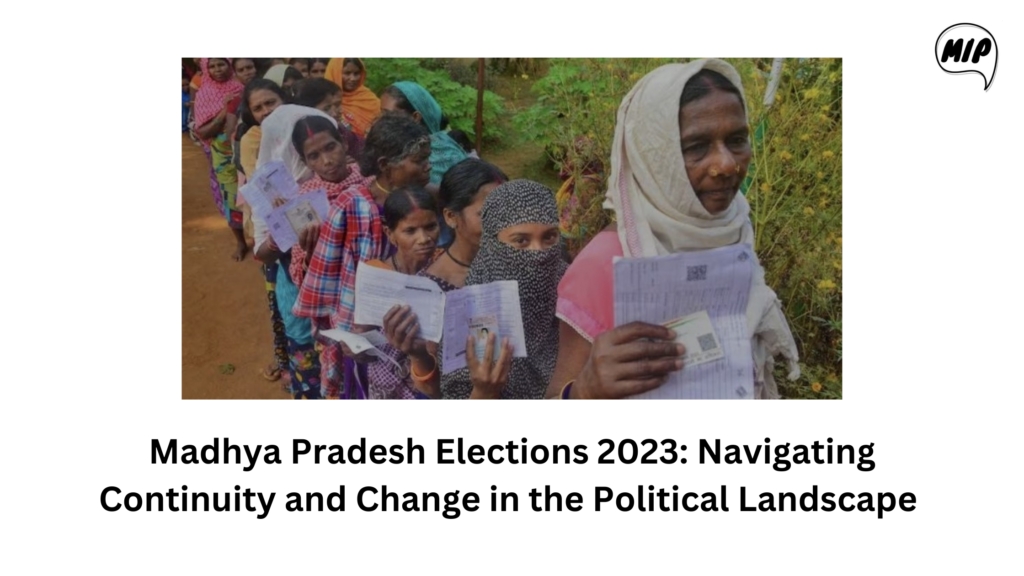
Madhya Pradesh is voting today and the choice before the 5.6 crore voters is between status quo and change represented by the BJP and the Congress respectively.
If one associates change of government with youthfulness and freshness, then the irony inherent in the choice is unmistakable. Shivraj Singh Chouhan (65) is the face of status quo, having been the chief minister for 18 years. His rival Kamal Nath is 12 years older –77 – and is the face of change.
The Congress’s CM face has also ruled the state for 15 months and that short period was hardly distinguishable from the long BJP rule that preceded and followed the Congress’s. So, the voter is presented with a Hobson’s choice, so to say.
When Chief Minister Shivraj Singh Chouhan assumed office in November 2005 he was 46 years old. His rival Kamal Nath, though a veteran politician, only received the opportunity to oust Chouhan at the ripe age of 77 in 2018. He is the oldest politician in Madhya Pradesh to become the alternative to an incumbent chief minister.
Late Arjun Singh had become Chief Minister in 1980 at the age of 50; Digvijay Singh got the coveted post in 1993 when he was 44 years old; his successor Uma Bharti led the BJP to power in 2003 when she was 45 years old.
Lack Of Alternatives
One common factor can be deduced from Chouhan’s longevity in the chief minister’s post and Kamal Nath’s rather late arrival to the MP arena to challenge his BJP rival. It is the inability of the second line of leaders in both the BJP and the Congress to convincingly project themselves as credible alternatives. Both the parties have been risk-averse even as Chouhan and Kamal Nath deftly managed to convince their respective high commands about their indispensability.
During his tenure, Chouhan shrewdly saw to it that all his potential rivals such as Uma Bharti, Kailash Vijayvargiya , Narottam Mishra, etc did not garner enough clout to pose a challenge to him. The chief minister’s uncanny ability to fawn over and ingratiate himself to the central leadership in the party at all times stood him in good stead.
As power dynamics in the BJP changed in 2014, the chief minister ditched his mentor LK Advani to propitiate the new boss Narendra Modi with astounding swiftness.
Even during this election too, Chouhan seems to have weathered the political storm surrounding his future to bounce back in the chief ministerial reckoning. Barely a month ago, Chouhan’s fate looked as good as sealed. But, as electioneering progressed, he forced the high command to acknowledge his indispensability.
Congress’s Discredited Second Line
Unlike Chouhan, his rival Kamal Nath didn’t have to kowtow to the Congress high command to get ahead in the race for CM post. In fact, the high command asked him to set the MP Congress house in order. When Kamal Nath took over as PCC president in April 2017, the state party unit was in disarray.
Only two leaders – Digvijaya Singh and Jyotiraditya Scindia – were its prominent faces. All other leaders of the second line such as Suresh Pachouri, Ajay Singh and Arun Yadav had squandered the opportunities they were given to prove their mettle. Pachouri as MPCC chief had miserably failed in the 2008 assembly poll; Arun Yadav in the same post proved no better in the 2013 election. Ajay Singh as Leader of Opposition between 2010 and 2013 had exhibited a singularly lacklustre performance.
Digvijaya Singh had ruled himself out of the CM race and Scindia’s ability to galvanise the party to face the formidable challenge from the BJP was doubtful in the eyes of the Gandhi family. The scion of the erstwhile Gwalior state was known for his arrogant royal attitude, a big disqualification to revive the moribund Congress in MP.
Therefore, Kamal Nath was seen as the best bet to snatch power from the BJP. The high command’s gambit paid off. Under Kamal Nath, the Congress wrested power from the BJP, albeit with a slender margin. However, as chief minister, Kamal Nath did not bring any substantial changes in the quality of governance. The short-lived Congress government was as much dogged by allegations of corruption as was the BJP’s.
Sense Of Déjà Vu
It is, therefore, no surprise that people’s aspirations in this election are markedly subdued. The pro-changers are more against the BJP than enamoured of the Congress.
The anti-changers swear by the ideology of the BJP but don’t expect Shivraj Singh Chouhan or any other name in his place to transform the state for better.